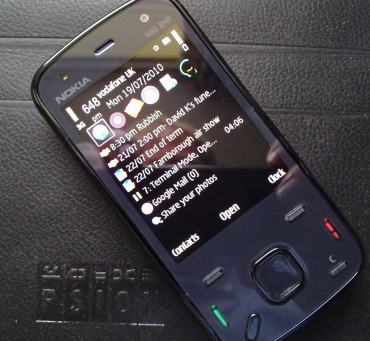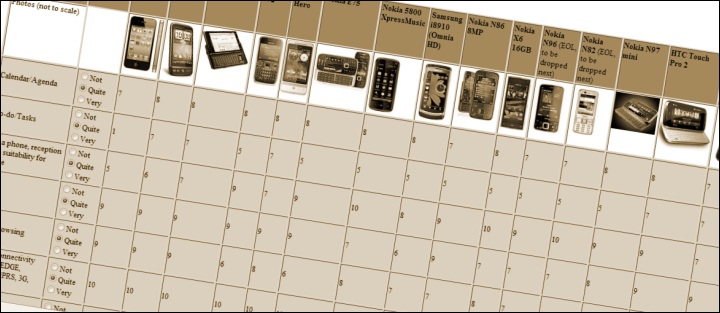By 'obsolete', I meant 'not made anymore', with the implication that very soon you wouldn't be able to buy them either - and that support was by no means guaranteed. In other words, an item that I casually referred to as 'obsolete' was something I didn't really feel happy recommending others to buy.
Of course, Mr Tact and Diplomacy here managed to upset a number of (among others) fans of the Google Nexus one and Nokia N900. My rationale was that the former wasn't being made anymore (it was announced as 'End Of Life' - EOL) and so there was no point adding it to the Grid. While the latter was deleted from the Grid because its OS has effectively been made obsolete, in that it's in the progress of being totally and utterly transformed and merged into the monster that is MeeGo.
The point of the irate users was well taken - for them 'obsolete' meant 'not fit for purpose anymore, too old to be any use, too out of date', another subtle meaning of the word. And, of course, it's absolutely true. Both the Nexus one and N900 are still very handy smartphones/pocket computers and have years of life in the hands of careful owners. But the matter did spark my thought processes, thinking back to some of my own slightly older smartphones and how I use them.
You see, the upgrade path, from firmware to firmware, whether we're talking Symbian, Android or Maemo, is rarely trivial. Even where there's data preservation (as is the case with most devices these days), the chances are that a full wipe and reinstall of data and apps is going to be needed at some point anyway. After all, something's not going to work right, detritus from a previous OS version is going to get blamed and a-backing up and a-wiping you'll go. While there's a certain masochistic pleasure in starting from scratch with a smartphone, it can also get pretty tiresome.
 So - once a favourite smartphone has reached 'End of life', once firmware updates are no longer being provided, how does it stand in terms of status in your pocket? I saw a forum comment yesterday in which the poster complained that firmware updates had stopped on his phone and so he was going to have to look for a new smartphone.
So - once a favourite smartphone has reached 'End of life', once firmware updates are no longer being provided, how does it stand in terms of status in your pocket? I saw a forum comment yesterday in which the poster complained that firmware updates had stopped on his phone and so he was going to have to look for a new smartphone.
Eh? Surely the new device will have new firmware with new features and... new bugs? Can I contend that there's actually a huge peace of mind in knowing that you can load up your favourite smartphone with software, build up bookmarks and tweak settings to your heart's content, knowing that never again will you have to go through a lossy backup-wipe/update-restore cycle. Never.
In my own inventory, for example, the Nokia N96 and N86 8MP are both effectively EOL, in that Nokia has indicated that there are no more planned firmware updates. Allowing me to be fairly lavish with the time I spend on the N86, in particular, getting it exactly as I like it, knowing that, on this device at least, I'll never have to go into this sort of detail again.
The same applies to (again in my own inventory) the Nokia E51, N82, E61i and E90, all no longer being updated but all useful in their own way and fully stocked with my apps and settings in case my SIM card needs a holiday(!) In short, these handsets are, I put it to you, 'Mature'.
* There's a big caveat to the above, of course. If there are serious issues/bugs remaining when the firmware stops being updated then life at EOL isn't so pleasant. This is, thankfully, a situation which is thankfully fairly rare in the Nokia world - maybe the E90 and N96 could have done with a little optimising and generally fixing up, but they're pretty stable. Sony Ericsson and Samsung don't have such a thorough record, mind you, so you'd have to approach EOL thinking on a device by device basis!
So, where one man (or woman)'s EOL smartphone is something to be abandoned because it's not cool enough or not bleeding edge enough, it's someone else's 'mature', trustworthy smartphone that has had all its rough edges long since knocked off.
If you're sitting on a Nokia E71 or N95 8GB, for example, or perhaps a Sony Ericsson P1i or even a Nokia 9500 Communicator then don't despise your aging electronic companion - it has worked hard and deserves its 'golden' time, undisturbed by the maelstrom of monthly bug-fix updates.
Steve Litchfield, AAS, 20 July 2010

